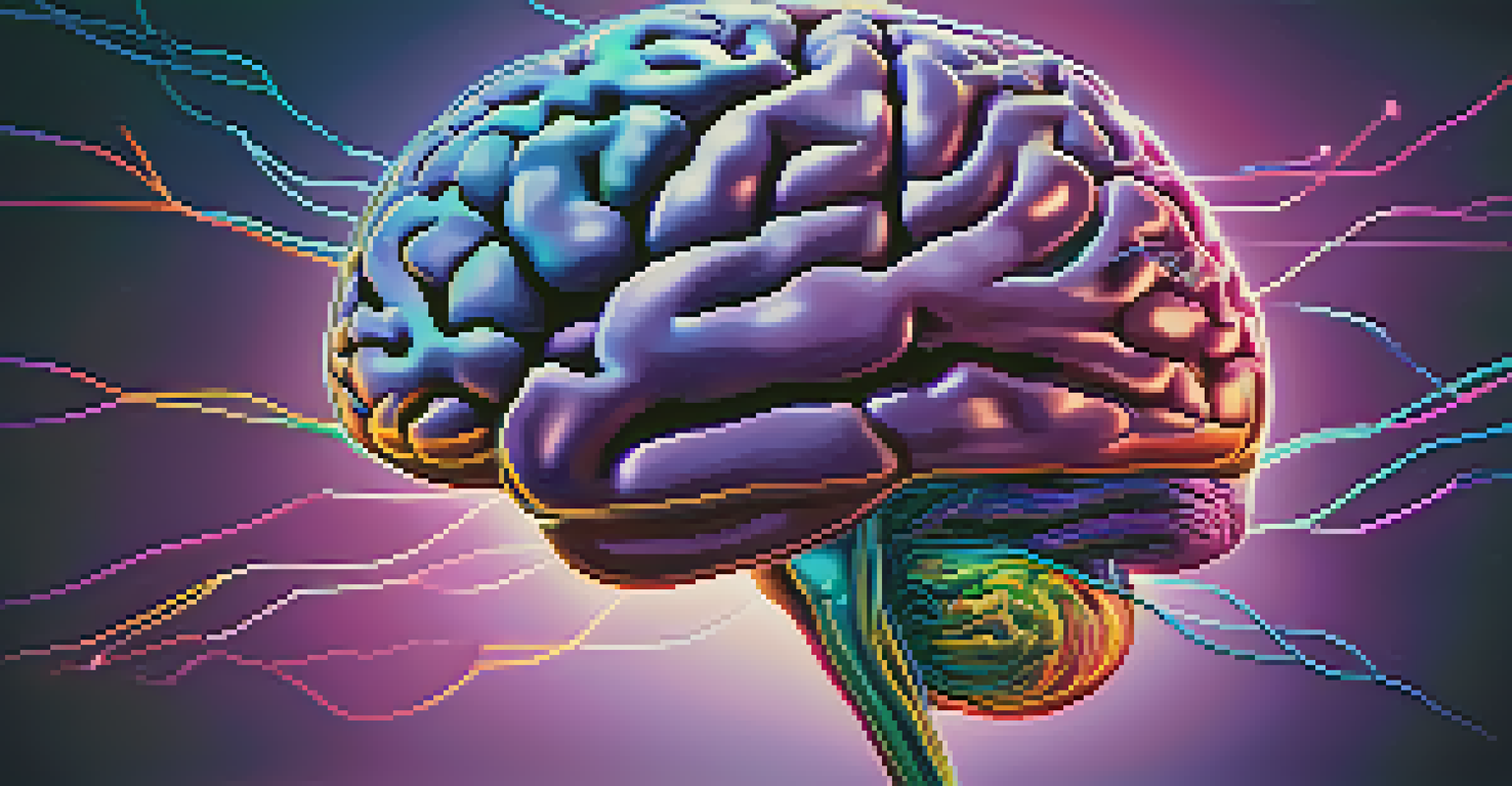Exploring Psychedelics: Effects on Immune System Functioning

Understanding Psychedelics and Their Uses
Psychedelics are substances that alter perception, mood, and various cognitive processes. Historically, they have been used in various cultures for spiritual and medicinal purposes, often facilitating profound personal insights. Recent research has reignited interest in these compounds, particularly for their potential therapeutic effects in mental health.
Psychedelics can help us understand the mind-body connection and how we can heal both mental and physical ailments.
Some common psychedelics include psilocybin (found in mushrooms), LSD, and ayahuasca. These substances interact with serotonin receptors in the brain, which can lead to altered states of consciousness. While the focus has largely been on their psychological effects, emerging studies suggest they may also influence physical health, including immune function.
By exploring the dual impact of psychedelics on both mind and body, we can better understand their potential applications. This intersection is particularly intriguing for researchers as they investigate how these substances could aid in healing and well-being.
The Immune System: A Brief Overview
Our immune system is like a complex army, constantly defending our bodies from harmful invaders such as bacteria and viruses. It consists of various cells, tissues, and organs working together to maintain our health. Understanding how this intricate system operates is crucial for exploring how external factors, like psychedelics, might have an impact.

Key players in the immune system include white blood cells, antibodies, and lymphatic tissues. Each component has a specific role, from identifying pathogens to orchestrating a response. A well-functioning immune system is essential for preventing illness and ensuring overall vitality.
Psychedelics Impact Mental Health
Psychedelics have shown potential therapeutic effects for mental health, possibly aiding conditions like PTSD and anxiety.
When considering the effects of psychedelics, it's important to recognize that any changes in immune function could have significant implications for health. This lays the groundwork for exploring how these substances might interact with our biological defense mechanisms.
Research Linking Psychedelics and Immune Response
Recent studies have begun to examine the relationship between psychedelics and immune system functioning, suggesting that these substances may have a modulating effect on immune responses. For instance, some research indicates that psychedelics might help reduce inflammation, a common factor in various health conditions. Inflammation can be both a friend and foe; while it helps fight infections, chronic inflammation can lead to serious diseases.
The experience of psychedelics is shaped by the mindset and environment in which they are taken, emphasizing the importance of set and setting.
Additionally, psychedelics have been shown to influence stress and anxiety levels, which are known to impact immune function. When stress is reduced, the immune system can function more effectively, creating a positive feedback loop. These findings open the door to considering psychedelics as potential adjunct therapies for improving immune health.
Although more extensive research is needed, these early findings provide a fascinating glimpse into how psychedelics may play a role in enhancing our immune responses. The interplay between mental health and physical health is more interconnected than we often realize.
Psychedelics and Inflammation: What We Know
Inflammation is a natural response of the immune system, but it can become problematic when it’s chronic. Some studies suggest that psychedelics like psilocybin may help reduce markers of inflammation in the body. By potentially dampening this response, psychedelics could help alleviate symptoms associated with inflammatory conditions.
For example, individuals suffering from autoimmune disorders—a group of diseases where the immune system attacks the body—may find relief through the anti-inflammatory properties of psychedelics. This opens up exciting avenues for research into how these substances can serve as complementary treatments.
Connection to Immune Function
Emerging research suggests psychedelics may modulate immune responses, potentially reducing inflammation and enhancing overall health.
While promising, it’s essential to approach this topic with caution. The mechanisms behind these effects are still being unraveled, and more clinical trials are necessary to establish safety and efficacy before these findings can be applied in practice.
Potential Benefits for Mental and Physical Health
The therapeutic potential of psychedelics extends beyond just mental health; they may also have benefits for physical health. By alleviating stress and anxiety, which can negatively affect immune function, psychedelics might promote better overall health. This holistic approach to healing is gaining traction in both medical and alternative health communities.
For instance, individuals who have experienced trauma or PTSD can see improvements in both mental and physical well-being through psychedelic-assisted therapy. This dual benefit highlights the importance of understanding how emotional state can affect immune health.
Ultimately, the integration of psychedelics into health regimens could lead to improved immune responses and better management of chronic conditions. However, it’s crucial to continue researching these compounds to uncover their full potential safely.
The Role of Set and Setting in Psychedelic Experiences
When it comes to psychedelics, the concepts of 'set' and 'setting' are crucial. 'Set' refers to the mindset of the individual, while 'setting' pertains to the environment in which the experience occurs. Both factors significantly influence the outcomes of a psychedelic experience, impacting emotional and physical responses.
A supportive and safe environment can enhance positive experiences, potentially leading to greater therapeutic benefits. Conversely, a negative or stressful setting can result in challenging experiences, which might affect not only the psychological outcomes but also the physiological responses, including those related to immune function.
Importance of Set and Setting
The mindset and environment during psychedelic experiences significantly influence their outcomes and therapeutic benefits.
Understanding the importance of these elements can help guide future research and therapeutic practices involving psychedelics. By optimizing set and setting, we can maximize the positive effects of these substances on health.
Safety Considerations and Future Directions
As we delve deeper into the effects of psychedelics on the immune system, safety remains a top priority. While many studies indicate potential benefits, it's vital to approach the use of psychedelics with caution. Not all individuals may experience positive outcomes, and adverse effects can occur, particularly without proper guidance.
Future research should focus on understanding the mechanisms behind these effects, determining safe dosages, and identifying individuals who may benefit the most. Collaboration between researchers, healthcare practitioners, and regulatory bodies will be essential in paving the way for safe and effective psychedelic therapies.

With growing interest and support for psychedelic research, we may soon uncover more about their potential role in enhancing immune system functioning. This could lead to groundbreaking therapies that combine mental and physical health treatments in innovative ways.